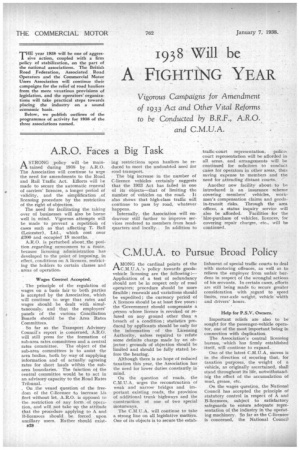A.R.O. Faces a Big Task
Page 12

If you've noticed an error in this article please click here to report it so we can fix it.
A STRONG policy will be maintained during 1938 by. A.R.O. The Association will continue to urge the need for. amendments to the Road and Rail Traffic Act. Efforts will he made to secure the automatic renewal
• of carriers licences, a longer period of validity, and the simplification of licensing procedure by the restriction of the right of objection.
The need for facilitating the taking over of businesses will also be borne well in mind. Vigorous attempts will be made to prevent a repetition of cases such as that affecting T. Ball (Leicester), Ltd., which cost over 300 and occupied 18 months.
A.R.O. is perturbed about_the position regarding newcomers to a route, because licensing administration has developed to the point of imposing, in effect, conditions on A licences, restricting the holders to certain classes and . areas of operation.
Wages Control Accepted.
The principle of the regulation of wages on a basis fair to both parties is accepted by the Association, which will continue to urge that rates and wages should be dealt with simultaneously, and that the employers' panels of the various Conciliation Boards should be the Area Rates Committees.
So far as the Transport Advisory Council's report is concerned, A.R.O. will still press for the formation of sub-area rates committees and a central rates committee, The object of the sub-area committees is to assist the area bodies, both by way of supplying information and of actually agreeing rates for short hauls within the subarea boundaries. The function of the central committee would be to act in an. advisory capacity to the Road Rates Tribunal.
On the vexed question of the freedom of the C-licensee to increase his fleet without let, A.R.O. is opposed io the. restriction -of any form of operation, and will not take up the attitude that the procedure applying to A and B-licensees should be forced upon ancillary users. Rather should exist B28 ing restrictions upon hauliers be reduced to meet the undoubted need for road transport_ The big increase in the number of C-licence vehicles certainly suggests that the 1933 Act has failed in one of its objects—that of limiting the number of vehicles on the road. It also shows that high-class traffic will continue to pass by road, whatever happens.
Internally, the Association will endeavour still further to improve services rendered to members from head quarters and locally. In addition to traffic-court representation, police-court representation will be afforded in all areas, and arrangements will be continued for solicitors to conduct cases for operators in other areas, thus saving expense to members and the need for attending distant courts.
Another new facility aboutto he introduced is an insurance scheme covering members' vehicles, workmen's compensation claims and goodsin-transit risks. Through the area offices, a status inquiry service will also be afforded. Facilities for the hire-purchase of vehicles, licences, for covering repair charges, etc., will be continued.
































